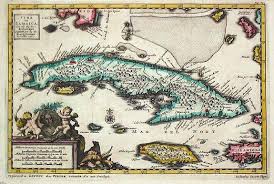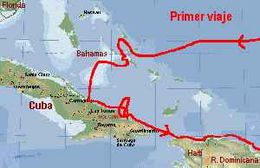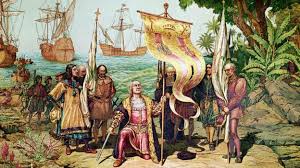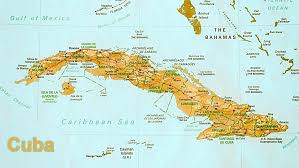 CUBA, ORIGEN DEL NOMBRE DE ESTA NUESTRA BELLA ISLA.
CUBA, ORIGEN DEL NOMBRE DE ESTA NUESTRA BELLA ISLA.
En el Diario de Navegación de Cristobal Colon el 21 de Octubre de 1492 aparece anotado por primera vez el nombre indigena de Cuba, en su forma de COLBA. Apenas habían transcurrido nueve días de su llegada a estas tierras cuando Colón escribe: “… y después, partir para otra isla grande mucho, que creo debe ser Cipango, según las señas que me dan estos indios que yo traigo a la cual ellos llaman Colba”.
El 23 de octubre, el Almirante de la Mar Oceána pudo identificar con mayor nitidez el nombre que los indígenas de las islas Lucayas daban a ese país, y anota en su diario: “Quisiera hoy partir para la isla de Cuba.”
Al arribar a las costas cubanas, el 27 de octubre de 1492, impresionado por sus bellezas naturales declara que Cuba era “la tierra más hermosa que ojos humanos habían visto”, bautizando a la isla con el nombre de Juana en honor al hijo de los Reyes Católicos.
Sin embargo, la variante femenina del nombre del príncipe Juan tuvo poca aceptación y poco después de fallecida Isabel de Castilla, el rey Fernando de Aragón dictó una Real Cédula de fecha 28 de febrero de 1525, para cambiarle el nombre a la isla por el suyo propio en la forma de Fernandina.
La mayor isla de Las Antillas también fue identificada por algunos cronistas de Indias como: Fernandina del Puerto Príncipe; Isla de la Habana; Isla de Santiago de Cuba e Isla de Santiago y del Ave María. Pero el nombre de Cuba siempre se mantuvo y al final se impuso sobre los diferentes topónimos con los cuales quisieron bautizar a esta tierra.
Existen muchas hipótesis sobre origen y contenido semántico del vocablo cuba. Según el sabio Don Fernando Ortiz, las palabras Cuba y Ciboney provienen de la lengua arahuaca y tienen una misma raíz: la voz ciba significa: piedra, montaña, cueva.
José Juan Arrom, en su discurso de ingreso a la Academia Cubana de la Lengua titulado Historia y sentido del nombre Cuba, expresó que existe en Suriname la palabra da Kuban equivalente a mi campo, mi terreno. En opinión de este autor: “Koba o Kuba debe ser por consiguiente, la voz que Colón oiría y eso vendría a explicar la vacilación del Almirante al registrarla abriendo o cerrando la vocal de la primera sílaba, primero como Colba y luego como Cuba”.
El vocablo Cuba existe en otras lenguas americanas: en chibcha es piedra; en arahuaco de la Guyana significa está; en la faneca de México es cerro; y en mapoyo de la Guyana Venezolana es laguna.
Juan Bosh, en su libro De Cristóbal Colón a Fidel Castro. El Caribe Frontera Imperial, escribió: “Es casi seguro que ese nombre de Cuba no designaba la totalidad de la isla. Los indios de las Antillas Mayores no formaban pueblos unidos; a lo más tribus; y debemos pensar que cada tribu denominaba al territorio que ocupaba no el de otras tribus. El nombre de Cuba debió ser usado por la tribuque señoreaba el lugar donde tocó Colón”.
Ciertamente, los aborígenes americanos, con la excepción de los incas, carecían de nombres que indicaran grandes extensiones de terreno. Cuba para los indios lucayos debió ser un nombre local y no el nombre de todo el territorio de la mayor isla antillana.
Pensemos ahora, Colón conoció de la existencia de Colba o Cuba cuando aún se encontraba en las costas arenosas de las Bahamas. ¿Qué significaba realmente esa palabra oída a los indígenas?; ¿era esta isla el lugar del que hablaron los indios lucayos?; ¿siguieron las carabelas el rumbo exacto para llegar al sitio indicado?
Tal vez esto no se pueda conocer con certeza, sin embargo, son incógnitas que no han dejado de inquietar a los estudiosos del tema a través de todos los tiempos.
El historiador alemán Sophus Ruge, en “La época de los descubrimientos geográficos”, relata que en Tabasco, el 25 de marzo de 1519, Hernán Cortés oyó el nombre de Culhua para indicar a Cholula, una de las más florecientes ciudades de la cultura mexicana.
Ruge, afirma: “Bernal Díaz del Castillo en su obra dice haberla oído mentar ya con la pronunciación de Culba antes de la expedición de Cortés; y es muy posible que cuando a Colón indicaron los naturales de las Antillas el nombre Colba hubiesen querido significar la ciudad mexicana de Cholula, pues que existía poca o mucha comunicación entre las islas y el continente”.
Piedra, montaña, cueva, mi campo, mi tierra o terreno, cerro, está, laguna y Cholula, no son los únicos significados que se atribuyen al nombre de Cuba.
Existen otras hipótesis que buscan el origen y significación de esta palabra en lenguas del Viejo Mundo.
En 1861 el doctor Andrés Rocha, le atribuyó un origen hebreo al plantear que Cuba se deriva del nombre Acuba, uno de los descendientes de Annón, hijo de Esdras, el famoso doctor judío que vivió en el siglo V a.n.e., de esta forma Rocha vincula al nombre de Cuba la leyenda de las diez tribus perdidas de Israel.
En el Diccionario cubano etimológico, crítico y razonado y comprensivo publicado en 1885, se dice que: “(…) Cuba se derivó de cuba (en el sentido de barrigón) procedente del hablativo singular de cupa, ae cuba o tonel, vocablo original del griego kupe, és, cavidad”.
Otra hipótesis considera que la palabra cuba procede del árabe qubba que se traduce como cúpula, es decir como la bóveda semiesférica que corona a muchas de las mezquitas y palacios construidos por los musulmanes. Los partidarios de esta versión argumentan que los mogotes avistados por Colón al descubrir la isla semejan cúpulas, aunque insisten en que el Gran Almirante no fue quien impuso el término, sino que este pudo llegar en épocas anteriores.
En las lenguas arábigas y fenicia Coba o Cobe, escritas con q, significan torrecilla; y en hebreo, asirio y caldeo, esas mismas palabras se traducen como cavidad, cueva, caverna.
Llegar a conocer la verdad absoluta sobre el origen del nombre de esta isla es tarea muy difícil, aunque no imposible. Para nosotros los cubanos el nombre de Cuba, significa patria, amor y razón de ser.
 CUBA, ORIGIN OF THE NAME OF OUR BEAUTIFUL ISLAND.
CUBA, ORIGIN OF THE NAME OF OUR BEAUTIFUL ISLAND.
In the Diario de Navegación de Cristobal Colon on October 21, 1492, the indigenous name of Cuba appears for the first time, in its form of COLBA. Barely nine days had elapsed since his arrival in these lands when Columbus wrote: “… and later, to leave for another large island a lot, which I think must be Cipango, according to the signs given to me by these Indians that I bring to which they call Colba “.
On October 23, the Admiral of the Ocean Sea was able to identify with greater clarity the name that the natives of the Lucaya Islands gave to that country, and he noted in his diary: “I would like to leave today for the island of Cuba.”
Upon arriving on the Cuban coast, on October 27, 1492, impressed by its natural beauties, he declared that Cuba was “the most beautiful land that human eyes had seen”, baptizing the island with the name of Juana in honor of the son of the Catholic Kings.
However, the feminine variant of the name of Prince Juan had little acceptance, and shortly after the death of Isabel de Castilla, King Fernando of Aragón issued a Royal Decree dated February 28, 1525, to change the name of the island to his own. own in the form of Fernandina.
The largest island of the Antilles was also identified by some chroniclers of the Indies as: Fernandina del Puerto Principe; Island of Havana; Island of Santiago de Cuba and Island of Santiago and Ave María. But the name of Cuba always remained and in the end, it was imposed on the different place names with which they wanted to baptize this land.
There are many hypotheses about the origin and semantic content of the word Cuba. According to the wise Don Fernando Ortiz, the words Cuba and Ciboney come from the Arawak language and have the same root: the ciba voice means stone, mountain, cave.
José Juan Arrom, in his speech at the entrance to the Cuban Academy of Language entitled History and meaning of the name Cuba, said that the word da Kuban exists in Suriname equivalent to my field, my field. In this author’s opinion: “Koba or Kuba must, therefore, be the voice that Columbus would hear and that would explain the Admiral’s hesitation when registering it by opening or closing the vowel of the first syllable, first as Colba and then as Cuba.”
The word Cuba exists in other American languages: in Chibcha it is stone; in Arawak from Guyana it means is; in the pout of Mexico it is hill; and in mapoyo of the Venezuelan Guyana it is a lagoon.
Juan Bosh, in his book From Cristóbal Colón to Fidel Castro. The Caribbean Imperial Border, wrote: “It is almost certain that that name of Cuba did not designate the entire island. The Indians of the Greater Antilles did not form united peoples; at most tribes; and we must think that each tribe called the territory that it did not occupy that of other tribes. The name of Cuba must have been used by the tribe that ruled the place where Columbus played. ”
Certainly, the American aborigines, with the exception of the Incas, lacked names to indicate large tracts of land. Cuba for the Lucayan Indians should have been a local name and not the name of the entire territory of the largest Antillean island.
Let’s think now, Columbus learned of the existence of Colba or Cuba when he was still on the sandy shores of the Bahamas. What did that word really mean when heard from the natives?; Was this island the place the Lucayan Indians spoke of ?; Did the caravels follow the exact course to reach the indicated place?
Perhaps this cannot be known with certainty, however, they are unknowns that have not ceased to disturb scholars of the subject throughout all times.
The German historian Sophus Ruge, in “The time of geographical discoveries”, relates that in Tabasco, on March 25, 1519, Hernán Cortés heard the name of Culhua to indicate Cholula, one of the most flourishing cities of Mexican culture.
Ruge, affirms: “Bernal Díaz del Castillo in his work says that he had already heard her mentioned with the pronunciation of Culba before the expedition of Cortés; and it is very possible that when the natives of the Antilles indicated the name Colba to Columbus, they wanted to mean the Mexican city of Cholula, since there was little or much communication between the islands and the mainland. ”
Stone, mountain, cave, my field, my land or terrain, hill, est, lagoon, and Cholula, are not the only meanings that are attributed to the name of Cuba.
There are other hypotheses that look for the origin and meaning of this word in Old World languages.
In 1861, Dr. Andrés Rocha attributed a Hebrew origin to it by stating that Cuba is derived from the name Acuba, one of the descendants of Annón, son of Esdras, the famous Jewish doctor who lived in the 5th century BC, in this way Rocha links to the name of Cuba the legend of the ten lost tribes of Israel.
In the etymological, critical and reasoned and comprehensive Cuban Dictionary published in 1885, it is said that: “(…) Cuba was derived from Cuba (in the sense of potbelly) from the singular speaking of cupa, ae cuba or tonel, a word original from the Greek kupe, es, cavity “.
Another hypothesis considers that the word Cuba comes from the Arabic qubba, which is translated as dome, that is, as the hemispherical vault that crowns many of the mosques and palaces built by the Muslims. Supporters of this version argue that the mogotes spotted by Columbus upon discovering the island resemble domes, although they insist that the Grand Admiral was not the one who imposed the term, but that it could have arrived in earlier times.
In the Arabic and Phoenician languages Coba or Cobe, written with q, mean turret; and in Hebrew, Assyrian, and Chaldean, those same words are translated cavity, cave, cavern.
Getting to know the absolute truth about the origin of the name of this island is a very difficult task, although not impossible. For us Cubans, the name of Cuba means homeland, love, and reason for being.
Agencies/ Wiki/ Ed. Am./ Acela Caner/ Extractos/ Excerpts/ Internet Photos/ Arnoldo Varona/ www.TheCubanHistory.com
THE CUBAN HISTORY, HOLLYWOOD.



 CUBA, Origen del Nombre de esta Nuestra Bella Isla. PHOTOS.
CUBA, Origen del Nombre de esta Nuestra Bella Isla. PHOTOS.





